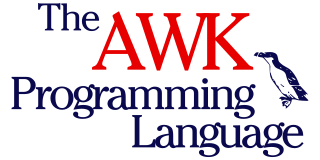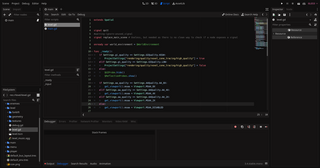External links
- Perl Design Patterns (archived) (wiki)
- Perl Design Patterns Book in Savannah
| People | |
|---|---|
| Things | |
| Frameworks | |
| Books | |
| Software | |
| Related | |
| | This article about a computer book or series of books is a stub. You can help Wikipedia by expanding it. |
Perl Design Patterns Book is an online textbook about Perl style and design and analysis. The contents are licensed under GNU Free Documentation License.

AWK (awk) is a domain-specific language designed for text processing and typically used as a data extraction and reporting tool. Like sed and grep, it is a filter, and is a standard feature of most Unix-like operating systems.

Larry Arnold Wall is an American computer programmer and author. He created the Perl programming language.

Perl is a family of two high-level, general-purpose, interpreted, dynamic programming languages. "Perl" refers to Perl 5, but from 2000 to 2019 it also referred to its redesigned "sister language", Perl 6, before the latter's name was officially changed to Raku in October 2019.

A regular expression is a sequence of characters that specifies a match pattern in text. Usually such patterns are used by string-searching algorithms for "find" or "find and replace" operations on strings, or for input validation. Regular expression techniques are developed in theoretical computer science and formal language theory.

sed is a Unix utility that parses and transforms text, using a simple, compact programming language. It was developed from 1973 to 1974 by Lee E. McMahon of Bell Labs, and is available today for most operating systems. sed was based on the scripting features of the interactive editor ed and the earlier qed. It was one of the earliest tools to support regular expressions, and remains in use for text processing, most notably with the substitution command. Popular alternative tools for plaintext string manipulation and "stream editing" include AWK and Perl.
grep is a command-line utility for searching plain-text data sets for lines that match a regular expression. Its name comes from the ed command g/re/p, which has the same effect. grep was originally developed for the Unix operating system, but later available for all Unix-like systems and some others such as OS-9.

Friedrich Salomon Perls, better known as Fritz Perls, was a German-born psychiatrist, psychoanalyst and psychotherapist. Perls coined the term "Gestalt therapy" to identify the form of psychotherapy that he developed with his wife, Laura Perls, in the 1940s and 1950s. Perls became associated with the Esalen Institute in 1964 and lived there until 1969.
In software engineering, the composite pattern is a partitioning design pattern. The composite pattern describes a group of objects that are treated the same way as a single instance of the same type of object. The intent of a composite is to "compose" objects into tree structures to represent part-whole hierarchies. Implementing the composite pattern lets clients treat individual objects and compositions uniformly.
In computer programming, glob patterns specify sets of filenames with wildcard characters. For example, the Unix Bash shell command mv *.txttextfiles/ moves all files with names ending in .txt from the current directory to the directory textfiles. Here, * is a wildcard standing for "any string of characters except /" and *.txt is a glob pattern. The other common wildcard is the question mark (?), which stands for one character. For example, mv?.txtshorttextfiles/ will move all files named with a single character followed by .txt from the current directory to directory shorttextfiles, while ??.txt would match all files whose name consists of 2 characters followed by .txt.
Action at a distance is an anti-pattern in computer science in which behavior in one part of a program varies wildly based on difficult or impossible to identify operations in another part of the program.
In computer programming, a one-liner program originally was textual input to the command-line of an operating system shell that performed some function in just one line of input. In the present day, a one-liner can be
In psychology, introjection is the unconscious adoption of the thoughts or personality traits of others. It occurs as a normal part of development, such as a child taking on parental values and attitudes. It can also be a defense mechanism in situations that arouse anxiety.

Raku is a member of the Perl family of programming languages. Formerly known as Perl 6, it was renamed in October 2019. Raku introduces elements of many modern and historical languages. Compatibility with Perl was not a goal, though a compatibility mode is part of the specification. The design process for Raku began in 2000.
Perl Compatible Regular Expressions (PCRE) is a library written in C, which implements a regular expression engine, inspired by the capabilities of the Perl programming language. Philip Hazel started writing PCRE in summer 1997. PCRE's syntax is much more powerful and flexible than either of the POSIX regular expression flavors and than that of many other regular-expression libraries.

Catalyst is an open source web application framework written in Perl, that closely follows the model–view–controller (MVC) architecture, and supports a number of experimental web patterns. It is written using Moose, a modern object system for Perl. Its design is heavily inspired by frameworks such as Ruby on Rails, Maypole, and Spring.
Raku rules are the regular expression, string matching and general-purpose parsing facility of the Raku programming language, and are a core part of the language. Since Perl's pattern-matching constructs have exceeded the capabilities of formal regular expressions for some time, Raku documentation refers to them exclusively as regexes, distancing the term from the formal definition.
Sean Michael Burke is a Perl programmer, author, and linguist. He was a columnist for The Perl Journal from 1998 and has written several dozen Perl modules for CPAN, as well as books for O'Reilly Media.

A scripting language or script language is a programming language that is used to manipulate, customize, and automate the facilities of an existing system. Scripting languages are usually interpreted at runtime rather than compiled.
Object-Oriented Programming (OOP) is a programming paradigm based on the concept of "objects", which can contain data and code. The data is in the form of fields, and the code is in the form of procedures.
The following outline is provided as an overview of and topical guide to the Perl programming language: